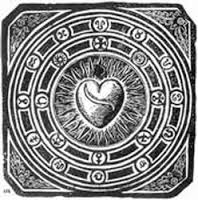Isaac Sírio — Tratados Místicos
Traduzidos para o inglês por A. J. Wensinck; obra publicada em 1923
XXXIII
ON THE ACTION OF DIVINE LOVE
Now that we have written the above (Capítulo 32), about spiritual allurements, it is time to explain ( this idea ). It is a DIM power which arises from love in the heart, at first without sensible causes, for it sets in motion the temperament, without personal vision or practical understanding or reasoning. And therefore it is thought to be without cause, because the mind is still vague. 219 This is its impression on the untrained. To the perfect the cause is revealed later, in connection with examination of it, and then the ( impression ) is still stronger, for delight is moving in the heart. A part of it is reserved in the body by the recipient; and another part is Sent to the psychic forces. For the heart is in the middle between psychic and bodily apperceptions; to the former it belongs organically, to the latter naturally. And the recipient directs the taste of its action towards both sides. Therefore the world is compelled to depart from it as it itself departs from the things of the world. We must necessarily inquire into the cause ( of this phenomenon ). Love is something hot by nature. And when it alights on any one without measure, it renders that soul as it were mad. Therefore the heart that perceives it, cannot contain and bear it without unusual excessive variations becoming manifest in it. And these signs it publishes in an apperceptive way, openly: at once the face becomes reddy and joyous, the body grows hot; fear and bashfulness are thrown away and it becomes as it were wanton; the power of concentration flees; impetuosity and disturbance reign. His own life forthwith is estimated as nothing in comparison with his Friend. Therefore even death, which was more dreadful to him than any thing, is the same to him as pleasure. And with all this, the gaze of the mind is not free from fantastic thoughts on Him. Afar, he speaks with Him as with one who is near. His knowledge inquires into the hidden state of Him who is concealed from sight. His gaze is natural and hostile to sensual apperception. In his actions, as in his sight, he is enflamed. He dwells in solitude, and deliberation entertains itself as it were with a partner and is stupefied.
This passion has enebriated martyrs and, driven by it, apostles have travelled through the whole earth in trance, the saints have been tormented, have suffered derision and were errino-in the wilderness. Composed, they have become deranged; wise, they have wilfully become foolish; bashful, they have become wanton with discernment-, exempt from affections ( they have walked ) in the flesh. Constantly demanding, they have become quiet without compulsion. May we be worthy to reach their madness by the compassion of our adorable God. Amen1.
If thou considerest thyself as having peace from the assault of the affections, before thou hast entered the town of humility, do not trust this. There is some ambush prepared for thee. Expect, after this peace, great trouble from them. While passing along all the apartments of virtues, thou wilt not find rest from thy tribulations nor relief from thy persecutors, till thy course will have reached the apartment of humility.
- In the text there follows: “who has taken a mediator from our race and given us these things through his hand; who was in all points tempted like as we are, yet without sin (Hebrews 4,15). On account of the equality of his natural flesh with ours, eternally without mixture, in the unity preserving the properties of the natures, He has made himself worthy of sitting to the right hand. Therefore praise and power and adoration to Him, now and in life without end for ever and ever”. The passage is lacking in the Greek translation and looks like a Nestorian addition.[↩]
